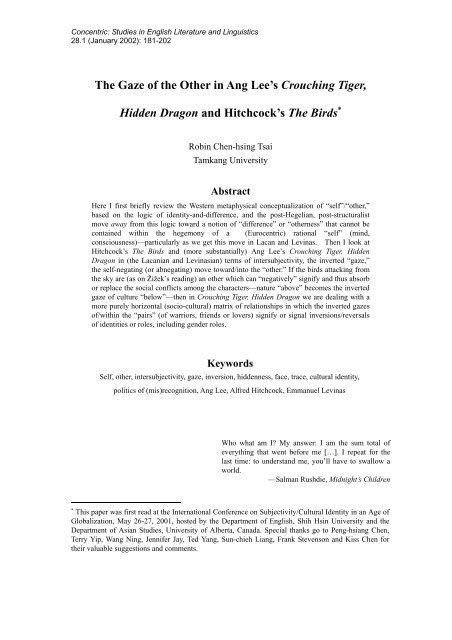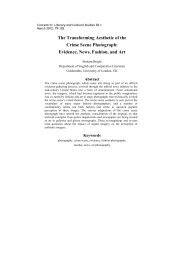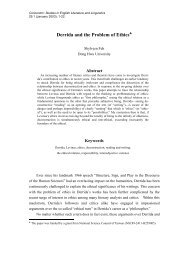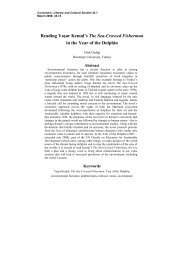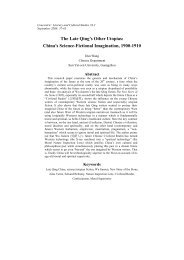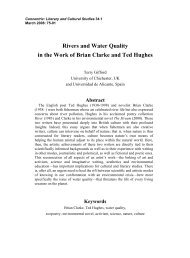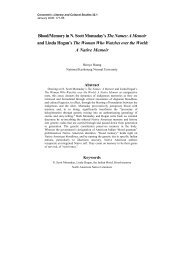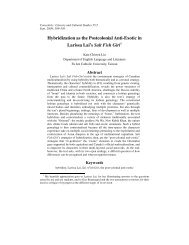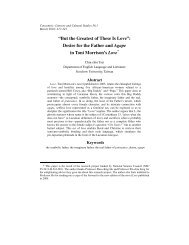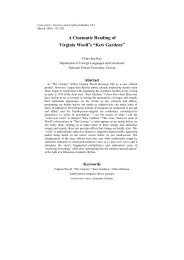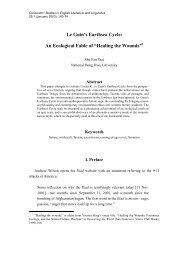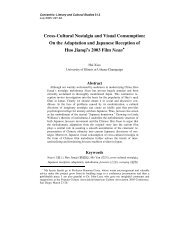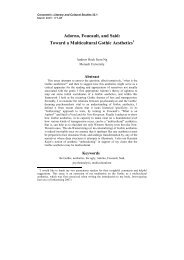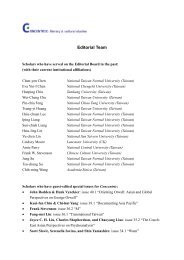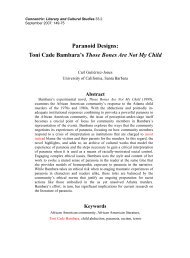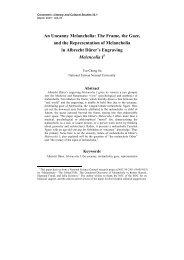The Gaze of the Other in Ang Lee's Crouching Tiger ... - Concentric
The Gaze of the Other in Ang Lee's Crouching Tiger ... - Concentric
The Gaze of the Other in Ang Lee's Crouching Tiger ... - Concentric
You also want an ePaper? Increase the reach of your titles
YUMPU automatically turns print PDFs into web optimized ePapers that Google loves.
<strong>Concentric</strong>: Studies <strong>in</strong> English Literature and L<strong>in</strong>guistics<br />
28.1 (January 2002): 181-202<br />
<strong>The</strong> <strong>Gaze</strong> <strong>of</strong> <strong>the</strong> O<strong>the</strong>r <strong>in</strong> <strong>Ang</strong> Lee’s Crouch<strong>in</strong>g <strong>Tiger</strong>,<br />
Hidden Dragon and Hitchcock’s <strong>The</strong> Birds ∗<br />
Rob<strong>in</strong> Chen-hs<strong>in</strong>g Tsai<br />
Tamkang University<br />
Abstract<br />
Here I first briefly review <strong>the</strong> Western metaphysical conceptualization <strong>of</strong> “self”/“o<strong>the</strong>r,”<br />
based on <strong>the</strong> logic <strong>of</strong> identity-and-difference, and <strong>the</strong> post-Hegelian, post-structuralist<br />
move away from this logic toward a notion <strong>of</strong> “difference” or “o<strong>the</strong>rness” that cannot be<br />
conta<strong>in</strong>ed with<strong>in</strong> <strong>the</strong> hegemony <strong>of</strong> a (Eurocentric) rational “self” (m<strong>in</strong>d,<br />
consciousness)—particularly as we get this move <strong>in</strong> Lacan and Lev<strong>in</strong>as. <strong>The</strong>n I look at<br />
Hitchcock’s <strong>The</strong> Birds and (more substantially) <strong>Ang</strong> Lee’s Crouch<strong>in</strong>g <strong>Tiger</strong>, Hidden<br />
Dragon <strong>in</strong> (<strong>the</strong> Lacanian and Lev<strong>in</strong>asian) terms <strong>of</strong> <strong>in</strong>tersubjectivity, <strong>the</strong> <strong>in</strong>verted “gaze,”<br />
<strong>the</strong> self-negat<strong>in</strong>g (or abnegat<strong>in</strong>g) move toward/<strong>in</strong>to <strong>the</strong> “o<strong>the</strong>r.” If <strong>the</strong> birds attack<strong>in</strong>g from<br />
<strong>the</strong> sky are (as on Žižek’s read<strong>in</strong>g) an o<strong>the</strong>r which can “negatively” signify and thus absorb<br />
or replace <strong>the</strong> social conflicts among <strong>the</strong> characters—nature “above” becomes <strong>the</strong> <strong>in</strong>verted<br />
gaze <strong>of</strong> culture “below”—<strong>the</strong>n <strong>in</strong> Crouch<strong>in</strong>g <strong>Tiger</strong>, Hidden Dragon we are deal<strong>in</strong>g with a<br />
more purely horizontal (socio-cultural) matrix <strong>of</strong> relationships <strong>in</strong> which <strong>the</strong> <strong>in</strong>verted gazes<br />
<strong>of</strong>/with<strong>in</strong> <strong>the</strong> “pairs” (<strong>of</strong> warriors, friends or lovers) signify or signal <strong>in</strong>versions/reversals<br />
<strong>of</strong> identities or roles, <strong>in</strong>clud<strong>in</strong>g gender roles.<br />
Keywords<br />
Self, o<strong>the</strong>r, <strong>in</strong>tersubjectivity, gaze, <strong>in</strong>version, hiddenness, face, trace, cultural identity,<br />
politics <strong>of</strong> (mis)recognition, <strong>Ang</strong> Lee, Alfred Hitchcock, Emmanuel Lev<strong>in</strong>as<br />
Who what am I? My answer: I am <strong>the</strong> sum total <strong>of</strong><br />
everyth<strong>in</strong>g that went before me […]. I repeat for <strong>the</strong><br />
last time: to understand me, you’ll have to swallow a<br />
world.<br />
—Salman Rushdie, Midnight’s Children<br />
∗ This paper was first read at <strong>the</strong> International Conference on Subjectivity/Cultural Identity <strong>in</strong> an Age <strong>of</strong><br />
Globalization, May 26-27, 2001, hosted by <strong>the</strong> Department <strong>of</strong> English, Shih Hs<strong>in</strong> University and <strong>the</strong><br />
Department <strong>of</strong> Asian Studies, University <strong>of</strong> Alberta, Canada. Special thanks go to Peng-hsiang Chen,<br />
Terry Yip, Wang N<strong>in</strong>g, Jennifer Jay, Ted Yang, Sun-chieh Liang, Frank Stevenson and Kiss Chen for<br />
<strong>the</strong>ir valuable suggestions and comments.
183<br />
Tsai: Crouch<strong>in</strong>g <strong>Tiger</strong> and <strong>The</strong> Birds<br />
<strong>in</strong>herent enlightenment cultural heritage from <strong>the</strong> European Enlightenment with its<br />
claustrophobic concept <strong>of</strong> Western Man. Kenneth Lieberman writes:<br />
<strong>The</strong> marriage <strong>of</strong> <strong>the</strong> idea <strong>of</strong> self and civil authority propelled <strong>the</strong> political imag<strong>in</strong>ation <strong>of</strong><br />
<strong>the</strong> Enlightenment and still characterizes <strong>the</strong> West today. Self-certa<strong>in</strong>, rational<br />
<strong>in</strong>dividuals, protected by <strong>the</strong> Declaration <strong>of</strong> <strong>the</strong> Rights <strong>of</strong> Man and its progeny, freely<br />
select <strong>in</strong> a Hobbesian fashion a civil authority that <strong>in</strong> reality tolerates little diversion<br />
from <strong>the</strong> accepted corpus <strong>of</strong> reified truths (<strong>the</strong>oria). It is pert<strong>in</strong>ent to note that Descartes’s<br />
first moral rule <strong>in</strong> his epochal Discourse on Method was “to obey <strong>the</strong> law and customs <strong>of</strong><br />
my country” and church. (128)<br />
If we look <strong>in</strong>to Western culture <strong>in</strong> terms <strong>of</strong> race, gender and class, we cannot fail to<br />
conclude that <strong>the</strong> history <strong>of</strong> Man is a history <strong>of</strong> discrim<strong>in</strong>ation by means <strong>of</strong> a<br />
“Manichean aes<strong>the</strong>tics” (JanMohamed 1-13; Goldberg 14-40). Accord<strong>in</strong>g to<br />
JanMohamed, Manicheanism exercises rules <strong>of</strong> exclusion and punitive strategies so<br />
that <strong>the</strong> division <strong>of</strong> labor and tokenism are rendered possible: “Faced with an<br />
<strong>in</strong>comprehensible and multifaceted alterity, <strong>the</strong> European <strong>the</strong>oretically has <strong>the</strong> option<br />
<strong>of</strong> respond<strong>in</strong>g to <strong>the</strong> O<strong>the</strong>r <strong>in</strong> terms <strong>of</strong> identity or difference” (“Colonialist Literature”<br />
83). Accord<strong>in</strong>g to Charles Taylor, “Manichean aes<strong>the</strong>tics” (<strong>the</strong> aes<strong>the</strong>tics <strong>of</strong> a logical<br />
identity-and-difference) “shows not just a lack <strong>of</strong> due respect” for <strong>the</strong> O<strong>the</strong>r. “It can<br />
<strong>in</strong>flict a grievous wound, saddl<strong>in</strong>g its victims with a crippl<strong>in</strong>g self-hatred” (26).<br />
<strong>The</strong> awaken<strong>in</strong>g from such narcissistic solipsism and ground<strong>in</strong>g egocentrism leads<br />
us, for Nietzsche, to a revaluation <strong>of</strong> all values. With him <strong>the</strong> prestigious idols—“self,”<br />
“God”—have reached <strong>the</strong>ir twilight and <strong>the</strong> chaotic, chang<strong>in</strong>g or self-different self<br />
appears. For <strong>the</strong> subject “I” to be taken as <strong>the</strong> condition <strong>of</strong> <strong>the</strong> predicate “th<strong>in</strong>k” is a<br />
falsification <strong>of</strong> facts s<strong>in</strong>ce this correspondence between subject and object is quite<br />
arbitrary; <strong>the</strong>re is no “subject,” <strong>the</strong>re is only an <strong>in</strong>terplay <strong>of</strong> perspectives, forces, wills;<br />
what we th<strong>in</strong>k we know as “truth” can only be “a supposition, an assertion, and<br />
assuredly not an ‘immediate certa<strong>in</strong>ty’” (Beyond Good and Evil 24). Thus <strong>in</strong> <strong>The</strong> Will<br />
to Power: “‘Subject,’ ‘object,’ ‘attribute’—<strong>the</strong>se dist<strong>in</strong>ctions are fabricated and are<br />
now imposed as a schematism upon all <strong>the</strong> apparent facts. <strong>The</strong> fundamental false<br />
observation is that I believe it is I who do someth<strong>in</strong>g, suffer someth<strong>in</strong>g, ‘have’<br />
someth<strong>in</strong>g, ‘have’ a quality” (294). Nietzsche’s demystification <strong>of</strong> <strong>the</strong> I purports to say<br />
“yes” to life and to go beyond <strong>the</strong> asceticism <strong>of</strong> Western philosophy and <strong>the</strong><br />
megalomaniac concept <strong>of</strong> subjectivity. Follow<strong>in</strong>g a Nietzschean l<strong>in</strong>e <strong>of</strong> thought and
28.1 (January 2002)<br />
flight, Deleuze l<strong>in</strong>ks up “life” with “vitalism” and “multiplicity”: “Pure immanence is<br />
A LIFE, and noth<strong>in</strong>g else […]. A life is <strong>the</strong> immanence <strong>of</strong> immanence, absolute<br />
immanence: it is sheer power, utter beatitude” (qtd. <strong>in</strong> Marks 39).<br />
However, while Nietzsche is right <strong>in</strong> po<strong>in</strong>t<strong>in</strong>g out that <strong>the</strong> ego is a “conceptual<br />
syn<strong>the</strong>sis,” his transevaluation <strong>of</strong> all values still revolves around a metaphysics <strong>of</strong> <strong>the</strong><br />
myth <strong>of</strong> “Will” (Lyotard 29). Derrida, like Nietzsche, assumes that <strong>the</strong> history <strong>of</strong><br />
Western ontology—a history <strong>of</strong> presence based on a s<strong>in</strong>gle, orig<strong>in</strong>ary, and ultimate<br />
truth or logocentrism, if you like, perceived by a transcendental ego—should be<br />
reconsidered <strong>in</strong> terms <strong>of</strong> a difference which, based <strong>in</strong> <strong>the</strong> self-difference <strong>of</strong> language<br />
(writ<strong>in</strong>g, mean<strong>in</strong>g), breaks away from <strong>the</strong> Platonic and Hegelian logic <strong>of</strong><br />
identity-and-difference. <strong>The</strong> problem <strong>of</strong> modern subjectivity thus becomes, for Lev<strong>in</strong>as,<br />
an overemphasis on “<strong>the</strong> consciousness <strong>of</strong> an ego identical <strong>in</strong> its I th<strong>in</strong>k,” an ego which<br />
aims at and embraces, or perceives, “all alterity under its <strong>the</strong>matiz<strong>in</strong>g gaze”<br />
(“Diachrony and Representation” 97). In o<strong>the</strong>r words, <strong>the</strong> voice <strong>of</strong> <strong>the</strong> “o<strong>the</strong>r” rema<strong>in</strong>s<br />
<strong>in</strong> effect unheard s<strong>in</strong>ce it is <strong>the</strong> correlate <strong>of</strong> an ego which, as see<strong>in</strong>g subject (Lacan),<br />
<strong>in</strong>tends, veils, conta<strong>in</strong>s <strong>the</strong> seen at a distance. Thus <strong>the</strong> “I’s” <strong>in</strong> <strong>the</strong> above-quoted<br />
passages (my epigraphs) are really voices from <strong>the</strong> marg<strong>in</strong>, voices <strong>of</strong> <strong>the</strong> o<strong>the</strong>r; as such<br />
<strong>the</strong>y have a sort <strong>of</strong> double consciousness.<br />
Accord<strong>in</strong>g to Fanon, <strong>the</strong>n, such terms as “Man,” “Self,” and “<strong>in</strong>dividual” po<strong>in</strong>t to a<br />
Westernized, monologic “difference-bl<strong>in</strong>dness” discourse; <strong>the</strong>y are all racialized<br />
residues <strong>of</strong> <strong>the</strong> White Man. Moreover:<br />
For Europe, for ourselves, and for humanity, comrades, we must turn over a new leaf, we<br />
must work out new concepts, and try to set afoot a new man. […] mank<strong>in</strong>d, I believe <strong>in</strong><br />
you. […] From all sides dozens and hundreds <strong>of</strong> pages assail me and try to impose <strong>the</strong>ir<br />
wills on me. But a s<strong>in</strong>gle l<strong>in</strong>e would be enough. Supply a s<strong>in</strong>gle answer and <strong>the</strong> color<br />
problem would be stripped <strong>of</strong> all its importance. What does a man want? What does <strong>the</strong><br />
black man want? (Wretched 316, 7-8)<br />
For Fanon, “mank<strong>in</strong>d” is a man-made construct based on Eurocentric White mythology.<br />
Under Western eyes, <strong>the</strong> subjectivity <strong>of</strong> <strong>the</strong> colored people and <strong>of</strong> those who are <strong>of</strong><br />
<strong>in</strong>terracial orig<strong>in</strong>s undergoes a process <strong>of</strong> dim<strong>in</strong>ishment. It is sacrificed and reduced<br />
<strong>in</strong>to <strong>the</strong> background under <strong>the</strong> gaze <strong>of</strong> colonialism and cultural imperialism.<br />
Consequently, identity for those “o<strong>the</strong>rs” who are mis-represented becomes an issue <strong>of</strong><br />
life and death. <strong>The</strong>y claim that a “[d]ue recognition [<strong>of</strong> <strong>the</strong> o<strong>the</strong>r] is not just a courtesy<br />
184
we owe people” but that “[i]t is a vital human need” (Taylor 26).<br />
I. <strong>The</strong> Emerg<strong>in</strong>g O<strong>the</strong>r<br />
185<br />
Tsai: Crouch<strong>in</strong>g <strong>Tiger</strong> and <strong>The</strong> Birds<br />
A symptomatic read<strong>in</strong>g <strong>of</strong> <strong>the</strong> (Eurocentric) narcissistic “I” <strong>the</strong>n suggests that for<br />
it <strong>the</strong> o<strong>the</strong>r is always an “alter ego” or “object” and as such someth<strong>in</strong>g that can be<br />
assimilated aga<strong>in</strong> with<strong>in</strong> <strong>the</strong> purview or “gaze” <strong>of</strong> <strong>the</strong> “I”—<strong>the</strong> “o<strong>the</strong>r” as someth<strong>in</strong>g<br />
truly o<strong>the</strong>r to or different from <strong>the</strong> self rema<strong>in</strong>s <strong>in</strong>visible and mute. Here I want to look<br />
a little more closely at <strong>the</strong> philosophical development <strong>of</strong> this I/o<strong>the</strong>r bifurcation,<br />
particularly <strong>in</strong> Descartes and Hegel, and <strong>the</strong>n look briefly also at attempts s<strong>in</strong>ce<br />
Nietzsche to salvage <strong>the</strong> “o<strong>the</strong>r” as that which escapes <strong>the</strong> hegemonic Western logic <strong>of</strong><br />
identity-and-difference—particularly those <strong>of</strong> Lacan and Lev<strong>in</strong>as.<br />
<strong>The</strong> modern Western notion <strong>of</strong> self-centered “ego” or “consciousness” really<br />
beg<strong>in</strong>s with Descartes, who claims that even if he doubts <strong>the</strong> existence <strong>of</strong> “himself” he<br />
is “now doubt<strong>in</strong>g” it, and s<strong>in</strong>ce doubt<strong>in</strong>g is a form <strong>of</strong> th<strong>in</strong>k<strong>in</strong>g he is “now th<strong>in</strong>k<strong>in</strong>g”: “I<br />
th<strong>in</strong>k, <strong>the</strong>refore I am,” that is, each moment <strong>in</strong> which I f<strong>in</strong>d myself th<strong>in</strong>k<strong>in</strong>g “I must<br />
exist, at least as a th<strong>in</strong>k<strong>in</strong>g th<strong>in</strong>g.” But this notion <strong>of</strong> a unified self or consciousness is<br />
really posited over aga<strong>in</strong>st that <strong>of</strong> absolute “o<strong>the</strong>r.” In <strong>the</strong> open<strong>in</strong>g paragraph <strong>of</strong><br />
Meditation II, Descartes employs “<strong>the</strong> O<strong>the</strong>r” to derive his fundamental axiom <strong>of</strong> <strong>the</strong><br />
Cogito ergo sum, argu<strong>in</strong>g that <strong>the</strong> existence <strong>of</strong> God as a mal<strong>in</strong> genie (“evil genius”) or<br />
absolute O<strong>the</strong>r presupposes <strong>the</strong> existence <strong>of</strong> <strong>the</strong> self-identical subject. But <strong>in</strong><br />
Meditation III, <strong>in</strong> his pro<strong>of</strong> that a perfect God exists, he moves <strong>the</strong> o<strong>the</strong>r way, from a<br />
ground <strong>in</strong> <strong>the</strong> self to a ground <strong>in</strong> <strong>the</strong> o<strong>the</strong>r: “[…] when I turn my m<strong>in</strong>d’s eye upon<br />
myself, I understand that I am a th<strong>in</strong>g which is <strong>in</strong>complete and dependent on an o<strong>the</strong>r<br />
and which aspires without limit to ever greater and better th<strong>in</strong>gs; but I also understand<br />
at <strong>the</strong> same time that he on whom I depend has with<strong>in</strong> him all those greater th<strong>in</strong>gs, not<br />
just <strong>in</strong>def<strong>in</strong>itely and potentially but actually and <strong>in</strong>f<strong>in</strong>itely, and hence that he is God”<br />
(Dicker 81). We may say that <strong>in</strong> both cases, Descartes employs <strong>the</strong> o<strong>the</strong>r to foreground<br />
<strong>the</strong> self. But Dalia Judovitz rephrases Derrida’s mistrust <strong>of</strong> Descartes’ strategy: “Thus<br />
<strong>the</strong> truth <strong>of</strong> <strong>the</strong> cogito’s existence is here established through <strong>the</strong> exercise <strong>of</strong> an<br />
impossible fiction, through a rhetoric <strong>of</strong> negation whose truth is based on <strong>the</strong> totaliz<strong>in</strong>g<br />
character <strong>of</strong> fiction and whose evidence relies on <strong>the</strong> power <strong>of</strong> representation to<br />
perform even its own negation, as if <strong>the</strong> verisimilitude <strong>of</strong> subject- tivity did not require
28.1 (January 2002)<br />
<strong>the</strong> substrate <strong>of</strong> language” (“Derrida and Descartes” 47).<br />
While <strong>the</strong> empiricist Hume considers <strong>the</strong> sense <strong>of</strong> our “self” or “m<strong>in</strong>d” to be a<br />
fiction based on an unwarranted <strong>in</strong>ference from a series <strong>of</strong> <strong>in</strong>com<strong>in</strong>g sense impressions,<br />
Kant comb<strong>in</strong>es Descartes and Hume by argu<strong>in</strong>g that our “m<strong>in</strong>d,” <strong>in</strong> effect, through<br />
space/time as projected forms <strong>of</strong> <strong>in</strong>tuition and <strong>the</strong> logical categories <strong>of</strong> understand<strong>in</strong>g<br />
imposes form or order upon <strong>the</strong> <strong>in</strong>com<strong>in</strong>g impressions <strong>in</strong> <strong>the</strong> act <strong>of</strong> perception. But<br />
Kant <strong>the</strong>refore separated (as had Descartes) subject and object: our noumenal m<strong>in</strong>d we<br />
could “th<strong>in</strong>k but not know” and <strong>the</strong> same for <strong>the</strong> noumenal “th<strong>in</strong>gs <strong>in</strong> <strong>the</strong>mselves;” all<br />
we could know was <strong>the</strong> overlap <strong>of</strong> <strong>the</strong> two <strong>in</strong> <strong>the</strong> phenomenal world <strong>of</strong> sense<br />
experience. Hegel <strong>the</strong>n, follow<strong>in</strong>g <strong>the</strong> German idealists Fichte and Schell<strong>in</strong>g, argued<br />
essentially that <strong>the</strong>re could be no firm subject-object dichotomy: <strong>the</strong> world (nature) is<br />
m<strong>in</strong>d-becom<strong>in</strong>g-conscious-<strong>of</strong>-itself through history, and m<strong>in</strong>d or subjectivity becomes<br />
conscious <strong>of</strong> itself through a series <strong>of</strong> dialectical moves, cast<strong>in</strong>g itself out as<br />
o<strong>the</strong>r-to-itself and absorb<strong>in</strong>g it (self) back aga<strong>in</strong>, based on a (dialectical) logic <strong>of</strong><br />
identity-and-difference. “[S]elf-consciousness is <strong>the</strong> reflection out <strong>of</strong> <strong>the</strong> be<strong>in</strong>g <strong>of</strong> <strong>the</strong><br />
world <strong>of</strong> sense and perception, and is essentially <strong>the</strong> return from o<strong>the</strong>rness”<br />
(Phenomenology 105). Hegel’s dialectical logic, while <strong>in</strong>sur<strong>in</strong>g on <strong>the</strong> one hand that<br />
self and o<strong>the</strong>r “recognize <strong>the</strong>mselves as mutually recogniz<strong>in</strong>g one ano<strong>the</strong>r,” is also<br />
driven by a force <strong>of</strong> negativity which becomes ano<strong>the</strong>r k<strong>in</strong>d <strong>of</strong> “o<strong>the</strong>r,” a “bad <strong>in</strong>f<strong>in</strong>ity”<br />
that must rema<strong>in</strong> <strong>in</strong> a sense “outside” <strong>the</strong> system. In this sense <strong>the</strong> true essence <strong>of</strong> <strong>the</strong><br />
Hegelian o<strong>the</strong>r is “darkness” (419).<br />
In his 20 th -century read<strong>in</strong>g <strong>of</strong> Hegel, Kojève emphasizes <strong>the</strong> role <strong>of</strong> recognition<br />
and desire <strong>in</strong> <strong>the</strong> dialectic: “<strong>the</strong> human reality is noth<strong>in</strong>g but <strong>the</strong> fact <strong>of</strong> <strong>the</strong> recognition<br />
<strong>of</strong> one man by ano<strong>the</strong>r man” (41). Man becomes conscious <strong>of</strong> himself when he says<br />
“I” but <strong>in</strong> <strong>the</strong> same moment he will be constituted, already for Hegel, as part <strong>of</strong> a more<br />
encompass<strong>in</strong>g social consciousness; only with<strong>in</strong> this wider <strong>in</strong>tersubjective order does<br />
<strong>the</strong> notion (or <strong>the</strong> “posit<strong>in</strong>g”) <strong>of</strong> <strong>the</strong> “I,” after all, really make sense. (<strong>The</strong> “I” is also<br />
<strong>the</strong> “he” or “she.”) But for Kojève this dialectical movement <strong>of</strong> (self-) consciousness is<br />
also a dialectical movement <strong>of</strong> desire. When one contemplates a th<strong>in</strong>g he is “absorbed”<br />
by it: it is through desire as lack that man becomes self-conscious because “<strong>the</strong> I <strong>of</strong><br />
Desire is an empt<strong>in</strong>ess that receives a real positive content only by negat<strong>in</strong>g action that<br />
satisfies Desire <strong>in</strong> destroy<strong>in</strong>g, transform<strong>in</strong>g, and ‘assimilat<strong>in</strong>g’ <strong>the</strong> desired non-I” (4).<br />
For Lacan, who attended Kojève’s Hegel lectures <strong>in</strong> Paris <strong>in</strong> <strong>the</strong> 1930’s,<br />
“recognition” or “identification” undergoes a still more complicated process. In “<strong>The</strong><br />
Mirror Stage” <strong>of</strong> early childhood development—which occurs when <strong>the</strong> child first sees<br />
186
187<br />
Tsai: Crouch<strong>in</strong>g <strong>Tiger</strong> and <strong>The</strong> Birds<br />
“himself” (“herself”) as <strong>the</strong> image or “o<strong>the</strong>r” reflected <strong>in</strong> <strong>the</strong> mirror, that is, as a k<strong>in</strong>d<br />
<strong>of</strong> “lack” or “difference”—we have “homeomorphic” identification and<br />
“heteromorphic” identification (Écrits 3). <strong>The</strong> former is related to <strong>the</strong> Lacanian “eye,”<br />
<strong>the</strong> latter to <strong>the</strong> “gaze.” Unlike Sartre, who conflates <strong>the</strong> gaze with “<strong>the</strong> act <strong>of</strong><br />
look<strong>in</strong>g,” Lacan dist<strong>in</strong>guishes “eye” and “gaze” and ties <strong>the</strong> latter to “<strong>the</strong> object <strong>of</strong> <strong>the</strong><br />
act <strong>of</strong> look<strong>in</strong>g” (Evans 72). In <strong>the</strong> scopic field <strong>the</strong>re is not completely symmetrical<br />
reciprocity <strong>of</strong> seer-seen: “when <strong>the</strong> subject looks at an object, <strong>the</strong> object is always<br />
already gaz<strong>in</strong>g back at <strong>the</strong> subject, but from a po<strong>in</strong>t at which <strong>the</strong> subject cannot see it”<br />
(Evans 72). Looked at <strong>in</strong> this way “self-identity” is fluid, subject to <strong>the</strong> <strong>in</strong>teraction<br />
between self and o<strong>the</strong>r. Identity as a self-sufficient, autonomous, sacrosanct entity—as<br />
one term <strong>in</strong> a stable self-o<strong>the</strong>r dialectical polarity—becomes problematic now that <strong>the</strong><br />
o<strong>the</strong>r (as perhaps predicted by Hegelian pure negativity) appears as an “event.”<br />
With Lev<strong>in</strong>as, who is <strong>in</strong>fluenced by Kierkegaard’s post-Hegelian concern with<br />
God’s absolute “command” to Abraham (<strong>the</strong> non-logical or absurd command <strong>of</strong> an<br />
absolute O<strong>the</strong>r), we get <strong>the</strong> notion <strong>of</strong> <strong>the</strong> o<strong>the</strong>r as demand, <strong>the</strong> demand for a (for its<br />
own) “space <strong>of</strong> enunciation.” This demand is “<strong>the</strong> call <strong>of</strong> <strong>the</strong> O<strong>the</strong>r” as <strong>the</strong> “articulat<strong>in</strong>g<br />
[<strong>of</strong>] a need” (Evans 34-35). From a Lev<strong>in</strong>asian perspective, <strong>the</strong>n, <strong>the</strong> relationship<br />
between self and o<strong>the</strong>r is not dialectical but properly ethical s<strong>in</strong>ce <strong>the</strong> o<strong>the</strong>r is now seen<br />
as one’s neighbor, one’s “fellow man” whose demand on us (on our own “subjectivity”)<br />
“signifies o<strong>the</strong>rwise than as […] present<strong>in</strong>g essence and entities” <strong>in</strong> <strong>the</strong> old Hegelian<br />
way (O<strong>the</strong>rwise 46). <strong>The</strong>refore <strong>the</strong> self (our self, myself) can no longer essentialize <strong>the</strong><br />
consciousness <strong>of</strong> <strong>the</strong> O<strong>the</strong>r or reduce it to <strong>the</strong> “I th<strong>in</strong>k.” In speak<strong>in</strong>g, communicat<strong>in</strong>g,<br />
“say<strong>in</strong>g,” we close <strong>the</strong> self-o<strong>the</strong>r distance: “[t]o say is to approach a neighbor” (48).<br />
Though say<strong>in</strong>g is communication, <strong>the</strong>n, this cannot be reduced to a phenomenology <strong>of</strong><br />
truth. <strong>The</strong> “subject” is no longer <strong>in</strong>, at home with, “himself”—like <strong>the</strong> “say<strong>in</strong>g” which<br />
answers <strong>the</strong> o<strong>the</strong>r’s demand <strong>the</strong> subject becomes now a k<strong>in</strong>d <strong>of</strong> passive force, an<br />
existence-for-<strong>the</strong>-o<strong>the</strong>r that is free <strong>of</strong> <strong>in</strong>tentionality, cognition, representation, horizon,<br />
and <strong>in</strong>teriority.: “An exposure to <strong>the</strong> o<strong>the</strong>r […] <strong>the</strong>-one-for-<strong>the</strong>-o<strong>the</strong>r to <strong>the</strong> po<strong>in</strong>t <strong>of</strong><br />
substitution, but a substitution <strong>in</strong> separation, that is, responsibility” (54). In<br />
communication, “[a]lterity comes to me [<strong>the</strong> self] from without, and comes by<br />
exceed<strong>in</strong>g my capacities” (O<strong>the</strong>rwise 4). <strong>The</strong> world <strong>of</strong> self is <strong>the</strong> world <strong>of</strong> Da [<strong>The</strong>re].<br />
It is a world <strong>of</strong> existence without existants, a transcendence and a pass<strong>in</strong>g over end<strong>in</strong>g<br />
at be<strong>in</strong>gs’ o<strong>the</strong>r (O<strong>the</strong>rwise 3).<br />
Lev<strong>in</strong>as critiques not only <strong>the</strong> Cartesian-Kantian-Hegelian tradition <strong>in</strong> Western<br />
philosophy, built on notions <strong>of</strong> ego and reason associated with light and knowledge,
28.1 (January 2002)<br />
but also Husserl’s (ultimately Cartesian and Platonic) phenomenology which sees<br />
consciouness as “<strong>in</strong>tentionality,” <strong>the</strong> field <strong>of</strong> conscousness as a “field <strong>of</strong><br />
mean<strong>in</strong>g-<strong>in</strong>tend<strong>in</strong>g acts.” For Lev<strong>in</strong>as “[t]he <strong>in</strong>tentionality <strong>of</strong> consciousness allows one<br />
to dist<strong>in</strong>guish <strong>the</strong> ego from th<strong>in</strong>gs, but it does not make solipsism disappear: its<br />
element—light—renders us master <strong>of</strong> <strong>the</strong> exterior world but is <strong>in</strong>capable <strong>of</strong><br />
discover<strong>in</strong>g a peer for us <strong>the</strong>re” (65). <strong>The</strong> o<strong>the</strong>r thus “hidden from our view”—for after<br />
all it is <strong>in</strong> one way impossible to stop th<strong>in</strong>k<strong>in</strong>g <strong>in</strong> “Cartesian” terms—is culturally,<br />
historically, and philosophically a “be<strong>in</strong>g without a face.” S/he is forever re-moved and<br />
back-grounded, unable to become a central figure <strong>in</strong> <strong>the</strong>/our scopic field.<br />
Lev<strong>in</strong>as <strong>the</strong>refore claims that perhaps art should seek to give a “face” to <strong>the</strong> o<strong>the</strong>r.<br />
In what follows, <strong>the</strong>n, I will venture an <strong>in</strong>terpretation <strong>of</strong> two c<strong>in</strong>ematic texts—Alfred<br />
Hitchcock’s <strong>The</strong> Birds and (more substantially) <strong>Ang</strong> Lee’s Crouch<strong>in</strong>g <strong>Tiger</strong>, Hidden<br />
Dragon and—<strong>in</strong> (Lacanian and Lev<strong>in</strong>asian) terms <strong>of</strong> caged egos, <strong>in</strong>verted gazes and<br />
<strong>the</strong> self-o<strong>the</strong>r relationship.<br />
II. Gaz<strong>in</strong>g Birds, Hidden Dragons<br />
Hitchcock’s <strong>The</strong> Birds explores <strong>the</strong> <strong>in</strong>teraction between subject and object, <strong>the</strong><br />
eye and <strong>the</strong> gaze, culture and nature. It opens with seabirds (seagulls) soar<strong>in</strong>g up <strong>in</strong>to<br />
<strong>the</strong> sky as a mov<strong>in</strong>g background. After an open<strong>in</strong>g sequence that plays on various<br />
forms <strong>of</strong> “gaze,” recognition and misrecognition <strong>in</strong> a pet shop, Hitchcock places (via a<br />
co<strong>in</strong>cidence) all his characters and events with<strong>in</strong> a familial web <strong>the</strong>matiz<strong>in</strong>g three<br />
k<strong>in</strong>ds <strong>of</strong> “birds”: (1) caged love-birds which stand for <strong>the</strong> human “ego,” (2) <strong>the</strong> caged<br />
members <strong>of</strong> Mitch’s family, especially Mitch’s mo<strong>the</strong>r Lydia who lives <strong>in</strong> her Oedipal,<br />
imag<strong>in</strong>ary world, and (3) <strong>the</strong> wild seabirds that represent <strong>the</strong> “o<strong>the</strong>r.” 1 <strong>The</strong> former two<br />
are “tamed” while <strong>the</strong> latter (as <strong>the</strong> O<strong>the</strong>r) is beyond man’s ken. What’s fasc<strong>in</strong>at<strong>in</strong>g<br />
here is that Mitch’s “visitor” Melanie is unaware <strong>of</strong> <strong>the</strong> impend<strong>in</strong>g danger—<strong>the</strong><br />
triangular web <strong>of</strong> love <strong>in</strong> which she is trapped and <strong>the</strong> attack <strong>of</strong> malicious seabirds that<br />
mirrors Lydia’s jealousy, possessiveness and aggressiveness (Horwitz 279).<br />
Be<strong>in</strong>g <strong>the</strong> fourth piece <strong>in</strong> a tetralogy about “<strong>the</strong> maternal superego”—<strong>the</strong> o<strong>the</strong>rs<br />
are Rear W<strong>in</strong>dow, <strong>The</strong> Man Who Knew Too Much and Psycho, and <strong>The</strong> Birds—this<br />
1 For Horwitz, “birds are associated with female hysteria and destructiveness” and <strong>the</strong> wild birds are<br />
symbols <strong>of</strong> “maternal anxiety which seeks to punish any form <strong>of</strong> sexual expression” (282).<br />
188
189<br />
Tsai: Crouch<strong>in</strong>g <strong>Tiger</strong> and <strong>The</strong> Birds<br />
film, Slavoj Žižek suggests, should be taken serially (98). Instead <strong>of</strong> regard<strong>in</strong>g <strong>the</strong><br />
attack<strong>in</strong>g birds as “an expression <strong>of</strong> Lydia’s jealousy,” Žižek sees <strong>the</strong>m as a catalyst and<br />
a solution to <strong>the</strong> domestic problem confronted by Mitch’s family members:<br />
<strong>The</strong>re is a key detail that supports our read<strong>in</strong>g; at <strong>the</strong> very end <strong>of</strong> <strong>the</strong> film, Mitch’s<br />
mo<strong>the</strong>r “accepts” Melanie as her son’s wife, gives her consent, and abandons her<br />
superego role (as <strong>in</strong>dicated by <strong>the</strong> fleet<strong>in</strong>g smile she and Melanie exchange <strong>in</strong> <strong>the</strong><br />
car)—and that is why, at that moment, <strong>the</strong>y are all able to leave <strong>the</strong> property that is be<strong>in</strong>g<br />
threatened by <strong>the</strong> birds: <strong>the</strong> birds are no longer needed, <strong>the</strong>ir role is f<strong>in</strong>ished. (106)<br />
Žižek thus <strong>of</strong>fers us a structural and functional read<strong>in</strong>g <strong>of</strong> <strong>the</strong> attack<strong>in</strong>g birds, one<br />
perhaps congruent with Horwitz’s <strong>in</strong>terpretation <strong>of</strong> <strong>the</strong> birds as an agent (or agents)<br />
<strong>of</strong> “surveillance.” Horwitz suggests that <strong>The</strong> Birds stages a “female rivalry over<br />
Mitch between his old lover Annie, Melanie, and Lydia” and that <strong>the</strong> attack<strong>in</strong>g birds<br />
are <strong>the</strong> “key” to this familial dilemma (280). After <strong>the</strong>ir traumatic experience,<br />
Mitch’s whole “family” can f<strong>in</strong>ally, by gett<strong>in</strong>g rid <strong>of</strong> <strong>the</strong> birds, cast out <strong>the</strong> nightmare<br />
<strong>of</strong> <strong>the</strong>ir contorted <strong>in</strong>ter-relationships. (And for Freud, we remember, a nightmare is<br />
still a form, however “twisted” or out <strong>of</strong> control, <strong>of</strong> wish fulfillment, <strong>of</strong> desire.) Thus<br />
though <strong>the</strong> end<strong>in</strong>g seems a happy one and Hitchcock does create a formal unity <strong>in</strong> <strong>the</strong><br />
film, <strong>the</strong> problem <strong>of</strong> <strong>the</strong> birds is not yet resolved; it merits our fur<strong>the</strong>r reflection. In<br />
“<strong>The</strong> Hitchcockian Blot,” Žižek summarizes Rob<strong>in</strong> Wood’s three ways <strong>of</strong> read<strong>in</strong>g <strong>the</strong><br />
film:<br />
Accord<strong>in</strong>g to <strong>the</strong> first, “cosmological” read<strong>in</strong>g, <strong>the</strong> attack <strong>of</strong> <strong>the</strong> birds can be<br />
viewed as embody<strong>in</strong>g Hitchcock’s vision <strong>of</strong> <strong>the</strong> universe, <strong>of</strong> <strong>the</strong> (human) cosmos as<br />
system […] that can be upset at any time, that can be thrown <strong>in</strong>to chaos by <strong>the</strong><br />
<strong>in</strong>tervention <strong>of</strong> pure chance […].<br />
For <strong>the</strong> second, “ecological” read<strong>in</strong>g, <strong>the</strong> film’s title could have been Birds <strong>of</strong> <strong>the</strong><br />
World, Unite!: <strong>in</strong> this read<strong>in</strong>g, <strong>the</strong> birds function as a condensation <strong>of</strong> exploited nature<br />
that f<strong>in</strong>ally rises up aga<strong>in</strong>st man’s heedless exploitation […].<br />
<strong>The</strong> third read<strong>in</strong>g sees <strong>the</strong> key to <strong>the</strong> film <strong>in</strong> <strong>the</strong> <strong>in</strong>tersubjective relations between<br />
<strong>the</strong> ma<strong>in</strong> characters (Melanie, Mitch, and his mo<strong>the</strong>r), which are far from be<strong>in</strong>g merely<br />
an <strong>in</strong>significant sidel<strong>in</strong>e to <strong>the</strong> “true” plot, <strong>the</strong> attack <strong>of</strong> <strong>the</strong> birds: <strong>the</strong> attack<strong>in</strong>g birds only<br />
“embody” a fundamental discord […]. (97-98)
28.1 (January 2002)<br />
Žižek <strong>the</strong>n focuses more on <strong>the</strong> third read<strong>in</strong>g, a “phenomenological” read<strong>in</strong>g <strong>in</strong> terms<br />
<strong>of</strong> human <strong>in</strong>tersubjectivity. 2 If we follow Žižek’s read<strong>in</strong>g <strong>of</strong> Hitchcock seriously and<br />
serially, we will f<strong>in</strong>d that <strong>the</strong> director has always loved birds:<br />
In North by Northwest we have what is perhaps <strong>the</strong> most famous Hitchcockian scene, <strong>the</strong><br />
attack by <strong>the</strong> plane—a steel bird—that pursues <strong>the</strong> hero across a flat, sun-baked<br />
landscape; <strong>in</strong> Psycho, Norman’s room is filled with stuffed mounted birds, and even <strong>the</strong><br />
body <strong>of</strong> his mummified mo<strong>the</strong>r rem<strong>in</strong>ds us <strong>of</strong> a stuffed bird; <strong>in</strong> <strong>The</strong> Birds, after <strong>the</strong><br />
(metaphorical) steel bird and <strong>the</strong> (metonymic) stuffed birds, we f<strong>in</strong>ally have actual live<br />
birds attack<strong>in</strong>g <strong>the</strong> town. (99)<br />
In privileg<strong>in</strong>g <strong>the</strong> emotional <strong>in</strong>trigues and <strong>in</strong>ter-relationships <strong>of</strong> characters above<br />
cosmological and ecological <strong>the</strong>mes, Žižek is also privileg<strong>in</strong>g culture over nature <strong>in</strong> <strong>the</strong><br />
order <strong>of</strong> th<strong>in</strong>gs. As an o<strong>the</strong>r to culture, nature is doubly removed from culture. It is not<br />
only alienated from <strong>the</strong> civilized world but also from man’s reason. But while <strong>the</strong><br />
purely natural force <strong>of</strong> attack<strong>in</strong>g birds becomes a force <strong>of</strong> <strong>in</strong>tra-cultural,<br />
<strong>in</strong>ter-subjective passions (a “storm <strong>of</strong> passion”) and thus too a solution to <strong>the</strong>se social<br />
conflicts—<strong>in</strong> particular here <strong>in</strong>tra-familial conflicts—<strong>the</strong>y still rema<strong>in</strong> a raw force <strong>of</strong><br />
nature and as such an O<strong>the</strong>r to our human society. In this way <strong>the</strong>y may be contrasted<br />
with <strong>the</strong> mild lovebirds—Melanie’s gift to Mitch’s sister—which, ra<strong>the</strong>r than <strong>the</strong><br />
<strong>in</strong>def<strong>in</strong>able force <strong>of</strong> desire itself, can be seen as <strong>the</strong> objects <strong>of</strong> desire, as tamed egos.<br />
As a rewrit<strong>in</strong>g <strong>of</strong> <strong>the</strong> visible and <strong>the</strong> <strong>in</strong>visible and <strong>of</strong> self and o<strong>the</strong>r, Lacan’s <strong>the</strong>ory<br />
<strong>of</strong> <strong>the</strong> eye and <strong>the</strong> gaze can help us revisit Hitchcock’s <strong>The</strong> Birds. Though he does not<br />
explore <strong>the</strong> Cartesian meditation <strong>in</strong> terms <strong>of</strong> phenomenological <strong>in</strong>tentionality, Lacan’s<br />
use <strong>of</strong> visual <strong>the</strong>ories to formulate “I saw myself see<strong>in</strong>g myself” is itself a masterstroke,<br />
<strong>in</strong> that it is, <strong>in</strong>deed, <strong>the</strong> paraphrase <strong>of</strong> a “Cartesian cogito by which <strong>the</strong> subject<br />
apprehends himself as thought” (Four Fundamental Essays 80). It resembles a dream<br />
vision <strong>in</strong> which <strong>the</strong> dreamer enters <strong>in</strong>to his own m<strong>in</strong>d (<strong>in</strong>to <strong>the</strong> m<strong>in</strong>d <strong>of</strong> <strong>the</strong> subject as<br />
2 In his <strong>The</strong> Ticklish Subject, Žižek defends <strong>the</strong> Cartesian subject: “All academic powers have entered<br />
<strong>in</strong>to a holy alliance to exorcise this [<strong>the</strong> Cartesian subject] spectre: <strong>the</strong> New Age obscurantist […] and<br />
<strong>the</strong> Heideggerian proponet <strong>of</strong> <strong>the</strong> thought <strong>of</strong> Be<strong>in</strong>g […] and Deep Ecologist (who blames Cartesian<br />
mechanicist materialism for provid<strong>in</strong>g <strong>the</strong> philosophical foundation for <strong>the</strong> ruthless exploitation <strong>of</strong><br />
nature)” (1). He <strong>the</strong>n makes two claims: (1) “Cartesian subjectivity cont<strong>in</strong>ues to be acknowledged by all<br />
academic powers as a powerful and still active <strong>in</strong>tellectual tradition,” and (2) “It is high time that <strong>the</strong><br />
partisans <strong>of</strong> Cartesian subjectivity should, <strong>in</strong> <strong>the</strong> face <strong>of</strong> <strong>the</strong> whole world, publish <strong>the</strong>ir aims, <strong>the</strong>ir<br />
tendencies, and meet this nursery tale <strong>of</strong> <strong>the</strong> Spectre <strong>of</strong> Cartesian subjectivity with <strong>the</strong> philosophical<br />
manifesto <strong>of</strong> Cartesian subjectivity itself” (1-2).<br />
190
191<br />
Tsai: Crouch<strong>in</strong>g <strong>Tiger</strong> and <strong>The</strong> Birds<br />
character with<strong>in</strong> <strong>the</strong> dream) and looks at what “he” (or “she”) is look<strong>in</strong>g at. Lacan later<br />
expla<strong>in</strong>s that this formulation captures <strong>the</strong> notion that “<strong>the</strong> consciousness, <strong>in</strong> its<br />
illusion <strong>of</strong> see<strong>in</strong>g itself see<strong>in</strong>g itself, f<strong>in</strong>ds its basis <strong>in</strong> <strong>the</strong> <strong>in</strong>side-out structure <strong>of</strong> <strong>the</strong><br />
gaze” (82). Thus self and o<strong>the</strong>r <strong>in</strong> <strong>the</strong> Cartesian “I th<strong>in</strong>k” becomes <strong>the</strong> problem <strong>of</strong> <strong>the</strong><br />
eye and <strong>the</strong> gaze—“See<strong>in</strong>g itself see<strong>in</strong>g itself.” In <strong>the</strong> scopic field <strong>the</strong> o<strong>the</strong>r is always<br />
already backgrounded, and <strong>the</strong> gaze is always imag<strong>in</strong>ed, for <strong>the</strong> human eye is<br />
disrupted by <strong>the</strong> gaze <strong>of</strong> <strong>the</strong> O<strong>the</strong>r: <strong>the</strong> relationship between <strong>the</strong> eye and <strong>the</strong> gaze, like<br />
<strong>the</strong> relationship between self and o<strong>the</strong>r, is <strong>in</strong>teractive, mutually implicated; <strong>the</strong>y are<br />
contradictory yet complementary. Thus Lacan asks: “Where is <strong>the</strong> background? Is it<br />
absent? No. Rupture, split, <strong>the</strong> stroke <strong>of</strong> <strong>the</strong> open<strong>in</strong>g makes absence emerge—just as<br />
<strong>the</strong> cry does not stand out aga<strong>in</strong>st a background <strong>of</strong> silence but on <strong>the</strong> contrary makes<br />
<strong>the</strong> silence emerge as silence” (26). And so <strong>the</strong> birds <strong>in</strong> Hitchcock’s <strong>The</strong> Birds always<br />
lurch <strong>in</strong> <strong>the</strong> background as “o<strong>the</strong>rs”: <strong>the</strong>y are ourselves “oversee<strong>in</strong>g” ourselves (as<br />
superego), Horwitz’s “agents <strong>of</strong> surveillance” seen now as an <strong>in</strong>verted <strong>in</strong>ter- subjective<br />
and <strong>in</strong>tra-subjective gaze, culture gazed down upon by a nature that has itself already<br />
become <strong>the</strong> <strong>in</strong>verted gaze <strong>of</strong> culture.<br />
In <strong>Ang</strong> Lee’s Crouch<strong>in</strong>g <strong>Tiger</strong>, Hidden Dragon we get no birds attack<strong>in</strong>g from<br />
above but humans (“named” as tigers and dragons) attack<strong>in</strong>g one ano<strong>the</strong>r. Such a<br />
description perhaps re<strong>in</strong>forces <strong>the</strong> conventional claim <strong>in</strong> comparative metaphysics that<br />
whereas Western th<strong>in</strong>k<strong>in</strong>g posits a duality <strong>of</strong> immanent and transcendent, human and<br />
div<strong>in</strong>e worlds—nature (or ra<strong>the</strong>r <strong>the</strong> supernatural, <strong>the</strong> “div<strong>in</strong>e”) as pure “o<strong>the</strong>r” to <strong>the</strong><br />
world <strong>of</strong> human society and culture—Ch<strong>in</strong>ese th<strong>in</strong>k<strong>in</strong>g posits a pervasively immanent<br />
culture (or “extended family”) that <strong>in</strong> effect “conta<strong>in</strong>s” <strong>the</strong> o<strong>the</strong>rness <strong>of</strong> nature/<strong>the</strong><br />
supernatural, <strong>in</strong> part by <strong>in</strong>clud<strong>in</strong>g its own history <strong>in</strong> <strong>the</strong> form <strong>of</strong> <strong>the</strong> disembodied spirits<br />
<strong>of</strong> <strong>the</strong> ancestors. 3 Thus <strong>the</strong> issue <strong>in</strong> <strong>Ang</strong> Lee’s film becomes, not <strong>the</strong> mechanism by<br />
which a natural/supernatural O<strong>the</strong>r (Hitchcock’s attack<strong>in</strong>g birds from <strong>the</strong> sky) can,<br />
through <strong>the</strong> force <strong>of</strong> its <strong>in</strong>verted “gaze,” negatively signify and thus somehow release,<br />
heal or absorb <strong>the</strong> <strong>in</strong>tra-cultural, <strong>in</strong>tra-social, <strong>in</strong>tra-familial, <strong>in</strong>tersubjective conflicts,<br />
but ra<strong>the</strong>r that by which <strong>the</strong> <strong>in</strong>verted <strong>in</strong>tersubjective gaze <strong>of</strong> <strong>in</strong>dividuals locked <strong>in</strong> <strong>the</strong><br />
embrace <strong>of</strong> mortal combat and/or romantic love (or friendship) resolves <strong>the</strong>ir<br />
3 See e.g. Hall and Ames, Hansen, Graham. <strong>The</strong> correlated Western dualities or hierarchies, absorbed<br />
<strong>in</strong>to a larger unity <strong>in</strong> <strong>the</strong> Ch<strong>in</strong>ese model, <strong>in</strong>clude transcendent/immanent, gods/humans, soul (spirit,<br />
m<strong>in</strong>d)/body, subject/object: thus we come back to a Western logic <strong>of</strong> identity-and-difference that was<br />
already present <strong>in</strong> Plato and Parmenides. Hansen goes so far as to claim that, whereas <strong>in</strong> Greek<br />
philosophical discourse (based on <strong>the</strong> logic <strong>of</strong> Indo-European languages) a subject states “truths” about<br />
an “objective reality,” Ch<strong>in</strong>ese philosophical discourse is a performative (ra<strong>the</strong>r than prepositional or<br />
constative) use <strong>of</strong> language, a “socially-guid<strong>in</strong>g” (or “formatt<strong>in</strong>g”) discourse.
28.1 (January 2002)<br />
“conflicts” by <strong>in</strong> effect revers<strong>in</strong>g or <strong>in</strong>vert<strong>in</strong>g <strong>the</strong>ir identities (or at least <strong>the</strong>ir “roles,”<br />
and <strong>in</strong> particular gender roles), 4 through a dynamic <strong>of</strong> self-abnegation and<br />
be<strong>in</strong>g-for-<strong>the</strong>-o<strong>the</strong>r (and its correlative be<strong>in</strong>g-for-self), with<strong>in</strong> this fully immanent,<br />
horizontal, socio-cultural matrix.<br />
Crouch<strong>in</strong>g <strong>Tiger</strong>, Hidden Dragon was orig<strong>in</strong>ally a martial arts novel by Du-lu<br />
Wang (1909-77) who became known, along with Bao-yu Kung, Sho-m<strong>in</strong>g Lee, and<br />
Chen-y<strong>in</strong>g Chen, as an “Old-style” martial arts fiction writer <strong>in</strong> nor<strong>the</strong>rn Ch<strong>in</strong>a (Chou<br />
1-13). Wang published a pentalogy <strong>of</strong> martial arts fiction: <strong>The</strong> Crane <strong>in</strong> Kung-lung,<br />
Precious Sword and Famous Ladies, <strong>The</strong> Sword’s Breath and Its Glamor, Crouch<strong>in</strong>g<br />
<strong>Tiger</strong>, Hidden Dragon, and <strong>The</strong> Iron Steed and <strong>the</strong> Silver Jar, <strong>the</strong> “Kung-Iron<br />
pentalogy” (Chou 10). Ssu-nian Hsu reads <strong>the</strong>se five popular fictions <strong>in</strong> terms <strong>of</strong> <strong>the</strong><br />
heroes’ “<strong>in</strong>ability” ra<strong>the</strong>r than “ability” to achieve a heroic deed, a po<strong>in</strong>t which<br />
dist<strong>in</strong>guishes Wang from o<strong>the</strong>r popular martial arts fiction writers:<br />
<strong>The</strong>y have a s<strong>in</strong>gle purpose <strong>in</strong> life—to fight for <strong>the</strong> right <strong>the</strong>y th<strong>in</strong>k right, but are<br />
sometimes at a loss about <strong>the</strong> noble cause <strong>the</strong>y are supposed to achieve, not because <strong>the</strong>y<br />
are unwill<strong>in</strong>g to sacrifice <strong>the</strong>mselves but because <strong>the</strong>y are all too will<strong>in</strong>g to sacrifice<br />
<strong>the</strong>mselves while not hav<strong>in</strong>g <strong>the</strong> slightest hope <strong>of</strong> br<strong>in</strong>g<strong>in</strong>g happ<strong>in</strong>ess to those <strong>the</strong>y love.<br />
<strong>The</strong> tragedy <strong>of</strong> love is not entirely imposed from outside, as with <strong>the</strong> traditional feudal<br />
laws or manners. Highly skilled <strong>in</strong> martial arts and all <strong>the</strong> strategies <strong>of</strong> hand-to-hand<br />
combat, <strong>the</strong>y can get <strong>the</strong> upper hand over <strong>the</strong>ir enemies, but when confronted with <strong>the</strong>ir<br />
own character, psychological foibles, <strong>in</strong>ner self, <strong>the</strong>y are never<strong>the</strong>less fight<strong>in</strong>g a los<strong>in</strong>g<br />
cause. Seen <strong>in</strong> this perspective, <strong>the</strong>ir enemy is <strong>the</strong>mselves. (Wang 1: 2; translation m<strong>in</strong>e)<br />
Hsu aptly po<strong>in</strong>ts out that Wang’s heroes are “anti-heroes.” Yet, trapped <strong>in</strong> <strong>the</strong> web<br />
<strong>of</strong> social <strong>in</strong>teraction <strong>in</strong> <strong>the</strong> world <strong>of</strong> martial arts, <strong>the</strong>y still have to be “heroes”—if not<br />
<strong>in</strong> order to survive than at least <strong>in</strong> order to catch and hold <strong>the</strong> reader’s <strong>in</strong>terest. What is<br />
tragic <strong>in</strong> Wang’s novelistic world is his writ<strong>in</strong>g <strong>of</strong> <strong>the</strong> limit: we sense that his<br />
anti-heroic fighters are imprisoned, unable to transcend a largely self-imposed limit.<br />
And yet <strong>in</strong>asmuch as this limit<strong>in</strong>g force is a function <strong>of</strong> <strong>the</strong> characters’ own<br />
self-sacrifice or self-negation, it arguably leads to its own “transcendence”: <strong>the</strong> major<br />
4 <strong>Ang</strong> Lee’s film is about anti-ethics; it is a rewrit<strong>in</strong>g <strong>of</strong> <strong>the</strong> traditionally male-centered Ch<strong>in</strong>ese<br />
(personal and cultural) identity; it po<strong>in</strong>ts toward conversion, rupture, a new direction. <strong>Ang</strong> Lee wants <strong>the</strong><br />
film’s viewers to consider <strong>the</strong> possibility <strong>of</strong> reconceptualiz<strong>in</strong>g (<strong>the</strong>ir own) (<strong>in</strong>ter-)subjectivity. That is,<br />
<strong>the</strong> film presents (<strong>in</strong> Lev<strong>in</strong>asian terms) not only <strong>the</strong> possibility <strong>of</strong> be<strong>in</strong>g compassionate toward <strong>the</strong> o<strong>the</strong>r<br />
but <strong>the</strong> possibility <strong>of</strong> becom<strong>in</strong>g (<strong>in</strong>terchang<strong>in</strong>g with) <strong>the</strong> o<strong>the</strong>r.<br />
192
28.1 (January 2002)<br />
Heaven too transcendental (or perhaps Christian as aga<strong>in</strong>st Buddhist) a “sp<strong>in</strong>” would<br />
after all set us back with<strong>in</strong> what is, accord<strong>in</strong>g to <strong>the</strong> standard comparative view<br />
mentioned above, a Western metaphysical framework. But we can also read this cave<br />
as a not-quite-Platonic one, and this l<strong>in</strong>e as suggest<strong>in</strong>g a sort <strong>of</strong> <strong>in</strong>def<strong>in</strong>ite<br />
“suspension” 8 —which frees one from limits—ra<strong>the</strong>r than a (totaliz<strong>in</strong>g) “conclusion.”<br />
This read<strong>in</strong>g is strongly suggested by <strong>the</strong> second and f<strong>in</strong>al climax that, closely<br />
follow<strong>in</strong>g it, echoes <strong>the</strong> first: stand<strong>in</strong>g with her lover T<strong>in</strong>y <strong>Tiger</strong> on <strong>the</strong> top <strong>of</strong> a high<br />
cliff near a famous Buddhist temple, Beloved Dragon suddenly jumps and, as <strong>the</strong> film<br />
ends, rema<strong>in</strong>s suspended (or float<strong>in</strong>g, hover<strong>in</strong>g) <strong>in</strong> <strong>the</strong> air.<br />
A Lev<strong>in</strong>asian read<strong>in</strong>g does after all compel us to resist <strong>the</strong> temptations (stronger<br />
no doubt <strong>in</strong> <strong>the</strong> film than <strong>in</strong> <strong>the</strong> novel) <strong>of</strong> a vertical-transcendent “O<strong>the</strong>r” here, and<br />
focus ra<strong>the</strong>r on <strong>the</strong> purely horizontal (and social) self-negation or self-becom<strong>in</strong>g-o<strong>the</strong>r<br />
<strong>of</strong> <strong>the</strong> world-weary but still liv<strong>in</strong>g Mu-bai. 9 What may be clearer <strong>in</strong> <strong>the</strong> (more purely<br />
“Ch<strong>in</strong>ese”) novel than <strong>in</strong> <strong>the</strong> film is <strong>the</strong> importance <strong>of</strong> Mu-bai’s relationship with <strong>the</strong><br />
young woman, Beloved Dragon: he becomes concerned about her, wants to control<br />
(for her own sake) her “wildness” and guide her on <strong>the</strong> “correct path.” Thus after first<br />
meet<strong>in</strong>g her Mu-bai assumes a responsibility which now beg<strong>in</strong>s to consume him; he<br />
abandons any dream he might have had <strong>of</strong> a future for himself (for <strong>in</strong>stance, <strong>the</strong><br />
ever-deferred dream <strong>of</strong> still marry<strong>in</strong>g Hsiu-lian) and becomes what Lev<strong>in</strong>as would call<br />
a fully ethical be<strong>in</strong>g, one who negates him/herself by putt<strong>in</strong>g him/herself fully <strong>in</strong> <strong>the</strong><br />
service <strong>of</strong> ano<strong>the</strong>r (an “o<strong>the</strong>r”). But it is almost as if Beloved Dragon “expands” with<br />
<strong>the</strong> added force or presence <strong>of</strong> her o<strong>the</strong>r (Mu-bai) “with<strong>in</strong>” her: she becomes<br />
<strong>in</strong>creas<strong>in</strong>gly egocentric and hedonistic (as we also clearly see <strong>in</strong> <strong>the</strong> film) as Mu-bai<br />
gradually “decreases,” loses his subjectivity. We could also say that Mu-bai, ra<strong>the</strong>r<br />
than wish<strong>in</strong>g to construct or expand his own subjectivity based on dreams <strong>of</strong> <strong>the</strong> future<br />
and <strong>the</strong> old “warrior code,” welcomes <strong>the</strong> o<strong>the</strong>r’s (Beloved Dragon’s) “disruption” <strong>of</strong><br />
his world, welcomes <strong>the</strong> full disruptive force <strong>of</strong> <strong>the</strong> “face” <strong>of</strong> <strong>the</strong> o<strong>the</strong>r, becomes a<br />
truly Lev<strong>in</strong>asian anti-hero. As his o<strong>the</strong>r’s desire (or “o<strong>the</strong>r desire”) po<strong>in</strong>ts toward <strong>the</strong><br />
<strong>in</strong>f<strong>in</strong>ite and wishes to reach <strong>the</strong> “beyond”—this is aga<strong>in</strong> <strong>the</strong> <strong>in</strong>def<strong>in</strong>ite (<strong>in</strong>f<strong>in</strong>ite)<br />
suspension <strong>of</strong> Beloved Dragon’s climactic plunge from <strong>the</strong> cliff—Mu-bai’s negated or<br />
8 See preced<strong>in</strong>g note on Mu-bai’s dy<strong>in</strong>g words. In Plato’s Republic <strong>the</strong> “philosopher” escapes from <strong>the</strong><br />
cave <strong>of</strong> “mere appearances” up <strong>in</strong>to <strong>the</strong> sunlight <strong>of</strong> “true forms” (“reality”); but <strong>Ang</strong> Lee gives us a ray<br />
<strong>of</strong> sunlight slant<strong>in</strong>g down <strong>in</strong>to <strong>the</strong> darkened cave, suggest<strong>in</strong>g not so much that this cave may already<br />
picture or po<strong>in</strong>t to a “transcendent” world as that (once aga<strong>in</strong>) <strong>the</strong> transcendent/immanent duality or<br />
hierarchy has been broken down, <strong>the</strong> “difference” suspended.<br />
9 And <strong>the</strong> Ch<strong>in</strong>ese sense <strong>of</strong> Mu-bai’s dy<strong>in</strong>g words may be (note 7) that he doesn’t (one doesn’t) really<br />
die; ancestral spirits are still part <strong>of</strong> a this-worldly extended family.<br />
194
195<br />
Tsai: Crouch<strong>in</strong>g <strong>Tiger</strong> and <strong>The</strong> Birds<br />
abnegated desire turns <strong>in</strong>ward and approaches a k<strong>in</strong>d <strong>of</strong> <strong>in</strong>f<strong>in</strong>ite <strong>in</strong>wardness<br />
(Kierkegaard), an <strong>in</strong>f<strong>in</strong>ite be<strong>in</strong>g-for-<strong>the</strong>-o<strong>the</strong>r as self-negativity which <strong>in</strong> itself<br />
engenders a k<strong>in</strong>d <strong>of</strong> absolute freedom. An <strong>in</strong>ward-turned desire, an <strong>in</strong>ward-turned gaze:<br />
an <strong>in</strong>verted gaze perhaps repeated (echoed, reflected) with variation by Beloved<br />
Dragon herself when she takes her f<strong>in</strong>al leap (<strong>of</strong> faith) <strong>in</strong>to pure suspension, while a<br />
shocked T<strong>in</strong>y <strong>Tiger</strong> gazes out and down at her float<strong>in</strong>g body.<br />
This “<strong>in</strong>verted gaze” also signals, <strong>of</strong> course, or allows for, that gender-ambiguity<br />
(androgyny) or gender-shift<strong>in</strong>g which expla<strong>in</strong>s to a degree <strong>the</strong> popularity <strong>of</strong> <strong>the</strong> film<br />
(especially <strong>in</strong> <strong>the</strong> West). Implicit <strong>in</strong> <strong>the</strong> novel and more explicit <strong>in</strong> <strong>the</strong> film—<strong>in</strong> part,<br />
aga<strong>in</strong>, because <strong>Ang</strong> Lee is appeal<strong>in</strong>g to a largely Western audience—is <strong>the</strong> feel<strong>in</strong>g that<br />
<strong>the</strong> passive, self-negat<strong>in</strong>g “knight” (gung-fu anti-hero) becomes woman-like<br />
(accord<strong>in</strong>g to <strong>the</strong> traditional, perhaps patriarchal characterization <strong>of</strong> “women”) while<br />
<strong>the</strong> aggressive women fighters become manlike. Thus not only is Mu-bai forced to<br />
<strong>in</strong>def<strong>in</strong>itely postpone “marriage” with Hsiu-lian but he even dies before her (<strong>in</strong> both<br />
senses <strong>of</strong> “before”) and <strong>in</strong> dy<strong>in</strong>g he announces that he will “wait for her to go first”<br />
before enter<strong>in</strong>g Heaven. 10 Beloved Dragon easily beats <strong>the</strong> numerous men she fights<br />
and she can even beat her lover T<strong>in</strong>y <strong>Tiger</strong> (who is ra<strong>the</strong>r “t<strong>in</strong>y” compared to her<br />
“dragon”) at least sometimes; <strong>the</strong> film portrays her <strong>in</strong>itial “encounter” with him as<br />
combat-becom<strong>in</strong>g-eroticism, as if she could perhaps (as a variation on Hsiu-lian) only<br />
understand romantic-erotic love <strong>in</strong> terms <strong>of</strong> mortal combat; <strong>in</strong> <strong>the</strong> f<strong>in</strong>al scene it is he<br />
who stands by shocked as she boldly jumps, takes her “leap <strong>of</strong> faith.” This is aga<strong>in</strong> a<br />
pass<strong>in</strong>g <strong>of</strong> self <strong>in</strong>to o<strong>the</strong>r on a horizontal (socio-cultural) scale now marked <strong>in</strong> terms <strong>of</strong><br />
gender—and as such may be read as one function, really, or one “face,” <strong>of</strong> a<br />
Lev<strong>in</strong>asian self-negation that leads to <strong>in</strong>ner freedom, now seen as <strong>the</strong> freedom from<br />
predeterm<strong>in</strong>ed gender roles.<br />
If an <strong>in</strong>verted gaze suspended “above” (or “below”) us, as <strong>in</strong> <strong>the</strong> f<strong>in</strong>al scene <strong>of</strong><br />
Beloved Dragon’s leap “beyond limits,” rem<strong>in</strong>ds us <strong>of</strong> Hitchcock’s birds “<strong>in</strong> flight”<br />
(on <strong>the</strong> Lacanian read<strong>in</strong>g), <strong>the</strong>n <strong>the</strong> attack<strong>in</strong>g, peck<strong>in</strong>g, stabb<strong>in</strong>g force <strong>of</strong> <strong>the</strong> birds is<br />
also suggested by <strong>the</strong> sword, “Green Dest<strong>in</strong>y,” <strong>in</strong> Crouch<strong>in</strong>g <strong>Tiger</strong>, Hidden Dragon.<br />
Mu-bai’s sword—four hundred years old, heavy, beautiful, dangerous, 2.9 feet <strong>in</strong><br />
length, 1.1 <strong>in</strong>ches <strong>in</strong> width, 1 <strong>in</strong>ch thick at <strong>the</strong> handle, with seven rubies miss<strong>in</strong>g from<br />
<strong>the</strong> hilt—was Mu-bai’s gift to Sir Te and, by be<strong>in</strong>g stolen, it draws Mu-bai aga<strong>in</strong>st his<br />
will back <strong>in</strong>to <strong>the</strong> web <strong>of</strong> <strong>the</strong> complex world <strong>of</strong> River and Lake; it directly connects<br />
10 At least <strong>in</strong> <strong>the</strong> English and perhaps Eurocentric translation; see note 7.
28.1 (January 2002)<br />
Mu-bai to Beloved Dragon, situat<strong>in</strong>g <strong>the</strong>m as mutual o<strong>the</strong>rs (with respect to it). This<br />
sword, which even when it kills draws no blood and is (<strong>the</strong>refore) <strong>the</strong> very<br />
embodiment <strong>of</strong> Mu-bai’s “righteousness” and “moral <strong>in</strong>tegrity” (Ye 290), is <strong>the</strong>n a<br />
transcendental signifier that signifies by its absence, an absent (lack<strong>in</strong>g, desired) o<strong>the</strong>r<br />
which (like Hitchcock’s birds) “replaces” <strong>the</strong> <strong>in</strong>tersubjective relationships <strong>of</strong> <strong>the</strong> plot<br />
but also <strong>in</strong> a sense br<strong>in</strong>gs <strong>the</strong>m <strong>in</strong>to play: its <strong>the</strong>ft (by Beloved Dragon) is what<br />
immediately br<strong>in</strong>gs, at least <strong>in</strong> <strong>the</strong> film version, Mu-bai and Beloved Dragon<br />
face-to-face. Indeed <strong>the</strong> sword, <strong>in</strong> replac<strong>in</strong>g or substitut<strong>in</strong>g for <strong>the</strong>ir “faces,” is itself a<br />
sort <strong>of</strong> face to which all <strong>the</strong> narrative traces lead: a “face” is not def<strong>in</strong>able (Lev<strong>in</strong>as)<br />
unless it establishes a relationship with illeity (<strong>in</strong>f<strong>in</strong>ite alterity), beyond (its) ipseity<br />
(selfhood), beyond be<strong>in</strong>g (au dela de l’etre). <strong>The</strong> presence <strong>of</strong> <strong>the</strong> o<strong>the</strong>r (sword, birds)<br />
signifies a trace which po<strong>in</strong>ts to a beyond.<br />
Perhaps we can read both Hitchcock’s and <strong>Ang</strong> Lee’s films, <strong>the</strong>n, <strong>in</strong> <strong>the</strong> light <strong>of</strong><br />
Lev<strong>in</strong>as’s notion that <strong>the</strong> importance <strong>of</strong> <strong>the</strong> o<strong>the</strong>r lies <strong>in</strong> her/his/its call<strong>in</strong>g <strong>in</strong>to question<br />
<strong>the</strong> concept <strong>of</strong> an “I.” This call<strong>in</strong>g is a sort <strong>of</strong> summon<strong>in</strong>g, as if “from above”: “[I]t is<br />
<strong>the</strong> summon<strong>in</strong>g <strong>of</strong> myself by <strong>the</strong> o<strong>the</strong>r (autrui), it is a responsibility toward those<br />
whom we do not even know” (Philosophical Writ<strong>in</strong>gs 81), or those who rema<strong>in</strong> hidden<br />
from us—perhaps even (though this may seem to “transcend” <strong>the</strong> purview <strong>of</strong> Lev<strong>in</strong>as)<br />
those birds zoom<strong>in</strong>g down upon us from <strong>the</strong> sky which, as a pure force nature that is<br />
(paradoxically) always already acculturated, can save us from ourselves. But if<br />
Beloved Dragon is heed<strong>in</strong>g such a “call” when she takes her leap, <strong>the</strong>n she is obey<strong>in</strong>g<br />
a sense <strong>of</strong> responsibility not to God or Nature, not to some generalized or absolute<br />
o<strong>the</strong>r but to someone she does know. In <strong>the</strong> film <strong>the</strong> <strong>in</strong>centive for her leap is related to<br />
her (future) romance with T<strong>in</strong>y <strong>Tiger</strong>; <strong>in</strong> <strong>the</strong> novel she jumps for her fa<strong>the</strong>r who lies<br />
prostrate on his sick bed because Beloved Dragon (through her egocentric, “male”<br />
ambition) has wrought havoc on her family. She is act<strong>in</strong>g on <strong>the</strong> traditional belief that<br />
whoever jumps from this place (near <strong>the</strong> sacred temple) and still lives can save her<br />
family (or, <strong>in</strong> <strong>the</strong> film’s perhaps more Westernized, romanticized sp<strong>in</strong>, save her<br />
“romance”). In <strong>the</strong> novel she jumps <strong>in</strong> a mood <strong>of</strong> self-abnegation, ashamed <strong>of</strong> her<br />
previous conduct, with a heart will<strong>in</strong>g at last to sacrifice (itself) for <strong>the</strong> o<strong>the</strong>r (for her<br />
family). For Lev<strong>in</strong>as, “Here to be or not to be is not <strong>the</strong> question where transcendence<br />
is concerned” (O<strong>the</strong>rwise 3)—for we move au dela de l’etre, “beyond be<strong>in</strong>g” (to <strong>the</strong><br />
O<strong>the</strong>r), where <strong>the</strong> “difference” will no longer “matter.” But we have to be careful<br />
about “transcendence” when look<strong>in</strong>g at Crouch<strong>in</strong>g <strong>Tiger</strong>, Hidden Dragon. A “Ch<strong>in</strong>ese”<br />
read<strong>in</strong>g <strong>of</strong> Lev<strong>in</strong>as’s “to be or not to be is not <strong>the</strong> question” is perhaps more likely to<br />
196
28.1 (January 2002)<br />
Harasym, Sarah, ed. Lev<strong>in</strong>as and Lacan: <strong>The</strong> Missed Encounter. Albany, N.Y.: SUNY<br />
P, 1998.<br />
Hegel, G. W. F. Phenomenology <strong>of</strong> Spirit. Trans. A. V. Miller. Oxford: Oxford UP,<br />
1973.<br />
Horwitz, Margaret M. “<strong>The</strong> Birds: A Mo<strong>the</strong>r’s Love.” In A Hitchcock: A Reader. Ed.<br />
Marshal Deutelbaum and Leland Poague. Ames, Iowa: Iowa State UP, 1986.<br />
Huang, Kerson. I Ch<strong>in</strong>g: <strong>The</strong> Oracle. Taipei: Bookman Books, Ltd., 1991.<br />
JanMohamed, Abdul R. “<strong>The</strong> Economy <strong>of</strong> Manichean Allegory: <strong>The</strong> Function <strong>of</strong><br />
Racial Difference <strong>in</strong> Colonialist Literature.” In “Race,” Writ<strong>in</strong>g, and Differene.<br />
Ed. Henry Louis Gates, Jr. Chicago: U <strong>of</strong> Chicago P, 1985.<br />
_____<br />
. Manichean Aes<strong>the</strong>tics. Amherst: U <strong>of</strong> Massachusetts P, 1983.<br />
Judovitz, Dalia. Subjectivity and Representation <strong>in</strong> Descartes: <strong>The</strong> Orig<strong>in</strong>s <strong>of</strong><br />
Modernity. Cambridge: Cambridge UP, 1988.<br />
_____<br />
. “Derrida and Descartes: Economiz<strong>in</strong>g Thought.” In Derrida and Deconstruction.<br />
Ed. Hugh J. Silverman. London: Routledge, 1989.<br />
Kojève, Alexandre. Introduction to <strong>the</strong> Read<strong>in</strong>g <strong>of</strong> Hegel. Trans. James H. Nichols, Jr.<br />
Ithaca: Cornell UP, 1969.<br />
Lacan, Jacques. Écrits: A Selection. Trans. Alan Sheridan. London: Tarvistock, 1977.<br />
_____<br />
. <strong>The</strong> Four Fundamental Concepts <strong>of</strong> Psycho-Analysis. Trans. Alan Sheridan. New<br />
York: Norton, 1981.<br />
Lee, <strong>Ang</strong>., dir. Crouch<strong>in</strong>g <strong>Tiger</strong>, Hidden Dragon. Taipei: Tien Hs<strong>in</strong>, 2000.<br />
Lev<strong>in</strong>as, Emmanuel. Basic Philosophical Writ<strong>in</strong>gs. Eds. Adriaan T. Peperzak, Simon<br />
Critchley, and Robert Bernasconi. Bloom<strong>in</strong>gton: Indiana UP, 1996.<br />
_____<br />
. Difficult Freedom. Trans. Sean Hand. Baltimore: <strong>The</strong> Johns Hopk<strong>in</strong>s UP, 1990.<br />
_____<br />
. O<strong>the</strong>rwise Than Be<strong>in</strong>g or Beyond Essence. Trans. Alphonso L<strong>in</strong>gis. Ne<strong>the</strong>rlands:<br />
Kluwer Academic Publishers, 1991.<br />
_____<br />
. Time and <strong>the</strong> O<strong>the</strong>r. Trans. Richard A. Cohen. Pittsburgh, Pennsylvania:<br />
Duquesne UP, 1987.<br />
_____<br />
. Totality and Inf<strong>in</strong>ity: An Essay on Exteriority. Trans. Alphonso L<strong>in</strong>gis. <strong>The</strong><br />
Hague: Mart<strong>in</strong>us Nijh<strong>of</strong>f, 1969.<br />
_____<br />
. “<strong>The</strong> Trace <strong>of</strong> <strong>the</strong> O<strong>the</strong>r.” In Deconstruction <strong>in</strong> Context. Ed. Mark C. Taylor.<br />
Chicago: <strong>The</strong> U <strong>of</strong> Chicago P, 1986.<br />
Lyotard, J-F. <strong>The</strong> Inhuman. Stanford: Stanford UP, 1991.<br />
Marks, John. Giles Deleuze. London: Pluto, 1998.<br />
Mortley, Raoul. French Philosophers <strong>in</strong> Conversation: Lev<strong>in</strong>as, Schneider, Serres,<br />
200
201<br />
Tsai: Crouch<strong>in</strong>g <strong>Tiger</strong> and <strong>The</strong> Birds<br />
Irigaray, Le Doeuff, Derrida. London: Routledge, 1991.<br />
Nietzsche, Friedrick. Beyond Good and Evil. Trans. W. Kaufmann. New York: V<strong>in</strong>tage,<br />
1966.<br />
_____<br />
. <strong>The</strong> Will to Power. Trans. W. Kaufmann. New York: V<strong>in</strong>tage, 1968.<br />
Peperzak, Adriaan. “From Intentionality to Responsibility.” Dallery and Scott 3-21.<br />
Shahar, Meir. “Martial-Arts Fiction and Martial-Arts Practice: <strong>The</strong> Concept <strong>of</strong> Qi <strong>in</strong><br />
J<strong>in</strong> Yong’s Novels.” In Proceed<strong>in</strong>gs <strong>of</strong> International Conference on J<strong>in</strong> Yong’s<br />
Novels. Ed. Chiu-quei Wang. Taipei: Yuan-Liou, 1999.<br />
Silverman, Hugh J., ed. Derrida and Deconstruction. London: Routledge, 1989.<br />
Spivak, G. “Can <strong>the</strong> Subaltern Speak?” In Marxism and <strong>the</strong> Interpretation <strong>of</strong> Culture.<br />
Ed. C. Nelson and L. Grosberg. Urbana, Ill.: U <strong>of</strong> Ill<strong>in</strong>ois P, 1988. 217-33.<br />
Taylor, Charles. Multiculturalism: Exam<strong>in</strong><strong>in</strong>g <strong>the</strong> Politics <strong>of</strong> Recognition. Ed. Amy<br />
Gutmann. Pr<strong>in</strong>ceton, New Jersey: Pr<strong>in</strong>ceton UP, 1994.<br />
<strong>The</strong>unissen, Michael. <strong>The</strong> O<strong>the</strong>r: Studies <strong>in</strong> <strong>the</strong> Social Ontology <strong>of</strong> Husserl, Heidegger,<br />
Sartre, and Buber. Trans. Christopher Macann. Cambridge, Massachusetts: MIT,<br />
1984.<br />
Wang, Chiu-quei, ed. Proceed<strong>in</strong>gs <strong>of</strong> International Conference on J<strong>in</strong> Yong’s Novels.<br />
Taipei: Yuan-Liou, 1999.<br />
Wang, Du-lu. Crouch<strong>in</strong>g <strong>Tiger</strong>, Hidden Dragon. 3 Vols. Rpt. Taipei: Yuan Ch<strong>in</strong>, 2001.<br />
Wilhelm, Richard and C.F. Baynes, ed. and trans. <strong>The</strong> I Ch<strong>in</strong>g or Book <strong>of</strong> Changes.<br />
Pr<strong>in</strong>ceton: Pr<strong>in</strong>ceton UP, 1950.<br />
Ye, Hongshen. <strong>The</strong> Art <strong>of</strong> Martial Arts Fiction: Ye Hongshen on Sword. Taipei:<br />
Lian-ch<strong>in</strong>, 1985.<br />
Žižek, Slavoj. Look<strong>in</strong>g Awry: An Introduction to Jacques Lacan Through Popular<br />
Culture. Cambridge, Massachusetts: MIT, 1991.<br />
_____ , ed. Everyth<strong>in</strong>g You Always Wanted to Know about Lacan (But Were Afraid to Ask<br />
Hitchcock). London: Verso, 1992.<br />
_____ . <strong>The</strong> Ticklish Subject: <strong>The</strong> Absent Center <strong>of</strong> Political Ontology. London: Verso,<br />
1999.<br />
About <strong>the</strong> Author<br />
Rob<strong>in</strong> Chen-hs<strong>in</strong>g Tsai received his Ph.D. from National Taiwan University. He is <strong>the</strong> Executive Editor<br />
<strong>of</strong> Tamkang Review. Currently he teaches at Tamkang University. He has written articles on Luce
28.1 (January 2002)<br />
Irigaray, Michel Foucault, Giles Deleuze and o<strong>the</strong>rs. His recent publication is entitled “From Mimesis to<br />
Simulation” (2000). He is now writ<strong>in</strong>g an essay on postmodern “land”/environmental ethics.<br />
202<br />
[ Received 7 October 2001;<br />
accepted December 20 2001;<br />
revised December 26 2001 ]


